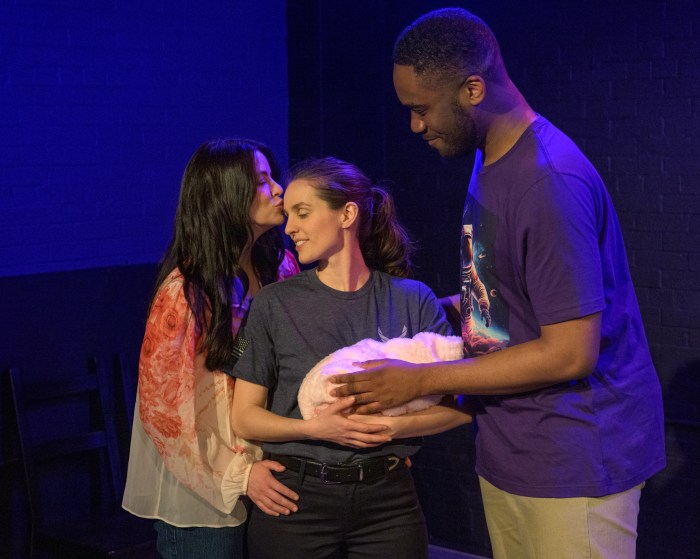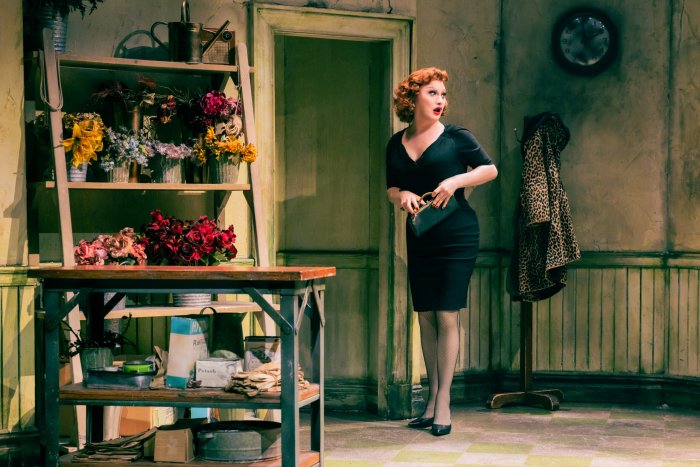Douglas Hodge in the title role of “Cyrano de Bergerac.” | JOAN MARCUS
BY CHRISTOPHER BYRNE | Memo to director Jamie Lloyd: If you insist on reviving “Cyrano de Bergerac,” please trust the script, especially when you are handed a sharp, new translation by Ranjit Bolt to work with. This is not a naturalistic piece, it’s poetry –– very specific poetry written by Edmond Rostand in the late 19th century to sound like the middle of the 17th century.
In the current production at Roundabout, Bolt’s translation intersperses contemporary words to what could be great comic effect were it not so often obscured by Lloyd’s over-the-top direction. The first scene in which Cyrano’s regiment is in Paris awaiting a confrontation between him and an actor he has banned from the stage — because he considers him a ham — is supposed to provide the bulk of the exposition and set up the characters and plot. Lloyd, however, has the actors talking over one another and carrying on with all the subtlety of frat boys watching the playoffs at Hooters. It is loud, false, and tedious.
Even after Cyrano enters, in one very comic bit of business, and his huge nose is made the stuff of sport, the confusion continues. His long speech about how much better a person of any real wit could insult him is largely obscured by hooting and commentary from the ensemble. The poetry of the speech is completely lost. Sadly, it’s all downhill from there.
The oft-told tale of how Cyrano becomes the voice of Christian, the handsome, young, but not very bright soldier, and woos the beautiful Roxanne, whom he secretly loves, unfolds without any of the lyricism one should rightly expect. The entire production is loud, dark, and unfocused, making it impossible for the audience to go along on this romantic journey.
Even Douglas Hodge in the title role is often upstaged by the production. He has plenty of charisma and handles the swagger well, but his performance is devoid of Cyrano’s torment. Cyrano’s internal conflict between war hero and romantic poet is central to this play, but Hodge never achieves it.
Clémence Poésy as Roxanne is completely miscast. Her performance shows neither the depth nor the poetry to convince us for a moment she is an object of romantic desire. Where she is supposed to be lyrical, she is almost completely without affect. When Roxanne visits Christian in the war, she comes in like a spunky June Allyson in a ‘30s varsity comedy.
Patrick Page as the Comte de Guiche, an aristocrat also seeking Roxanne’s hand, is fey and mannered, providing no real competition for her affections.
Given its classic story, beautiful language, and romance, I always thought “Cyrano” was foolproof. How wrong I was.
After the recent compelling production of Horton Foote’s “Harrison, TX” from Primary Stages, it’s inevitable that the new production of “Him” by Foote’s daughter Daisy should invite comparison. Unfortunately, it is a letdown. Set in 2003 in rural New Hampshire, rather than Texas, the play covers familiar Foote territory, including family legacy, history, buried resentment, and unresolved relationships.
Pauline and Henry are adult siblings who have lived with their dying but cruel father and are struggling to make ends meet as the family store is being pushed out by big supermarkets. Their lives are complicated by their need to care for their developmentally disabled brother Farley, as well. After their father –– the Him of the title –– dies, the resentment boils over and is expressed in monologues that we learn are his journal entries.
Things change quickly, however, when they realize they’ve inherited a lot of land that’s ripe for development. Pauline seizes on the chance to be wealthy with ferocity, but Henry can’t overcome his complicated relationship to his father. The story soon gets convoluted, with a subplot about Farley and a similarly afflicted neighbor, Louise, who ends up pregnant and so marries him.
The only character who makes any sense is Pauline. After a life of privation being spiritually beaten down by her father, her desire for revenge and willingness to disavow her father’s wishes in order to get rich are clear. Henry’s motivations are less obvious, his homosexuality seemingly a random fact that is no more than a cliché for his inability to develop any meaningful relationship. The subplot about Farley seems gratuitous, designed to flesh out a thin story.
The performances under the direction of Evan Yinoulis are competent. Tim Hopper as Henry, Adam LeFevre as Farley, and Adina Verson as Louise are better than the roles they’ve been given. Foote’s sister Hallie as Pauline turns in the kind of focused and understated performance we’ve come to expect from her. She is always interesting to watch, but the play doesn’t ask her to move beyond the kinds of characters we’ve seen her play before.
Horton Foote was always known for his detailed exploration of small stories and the motivations of the heart. His daughter has some catching up to do.
CYRANO DE BERGERAC | Roundabout Theatre Company | American Airlines Theater | 227 W. 42nd St. | Through Nov. 25; Tue.-Sat. at 8 p.m.; Wed., Sat., Sun. at 2 p.m. | $42-$127| Roundabouttheatre.org or 212-719-1300
HIM | Primary Stages at 59E59 | 59 E. 59th St. | Through Oct. 28 |Tue.-Thu. at 7 p.m. | Fri.-Sat. at 8 p.m.; Sat. at 2 p.m.; Sun. at 3 p.m. | $70 | TicketCentral.com or 212-279-4200


































